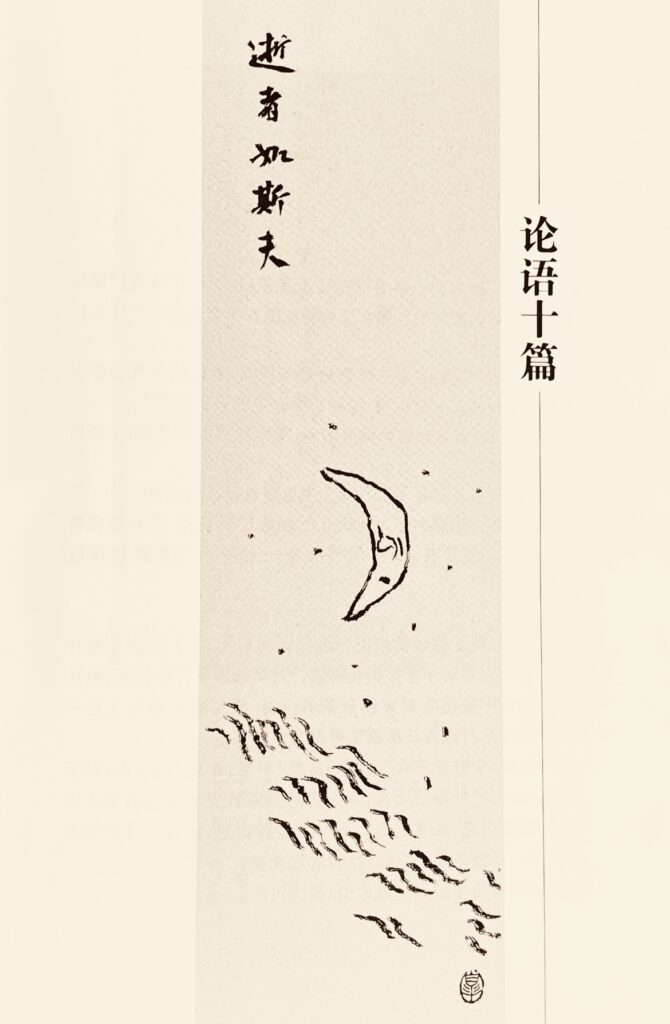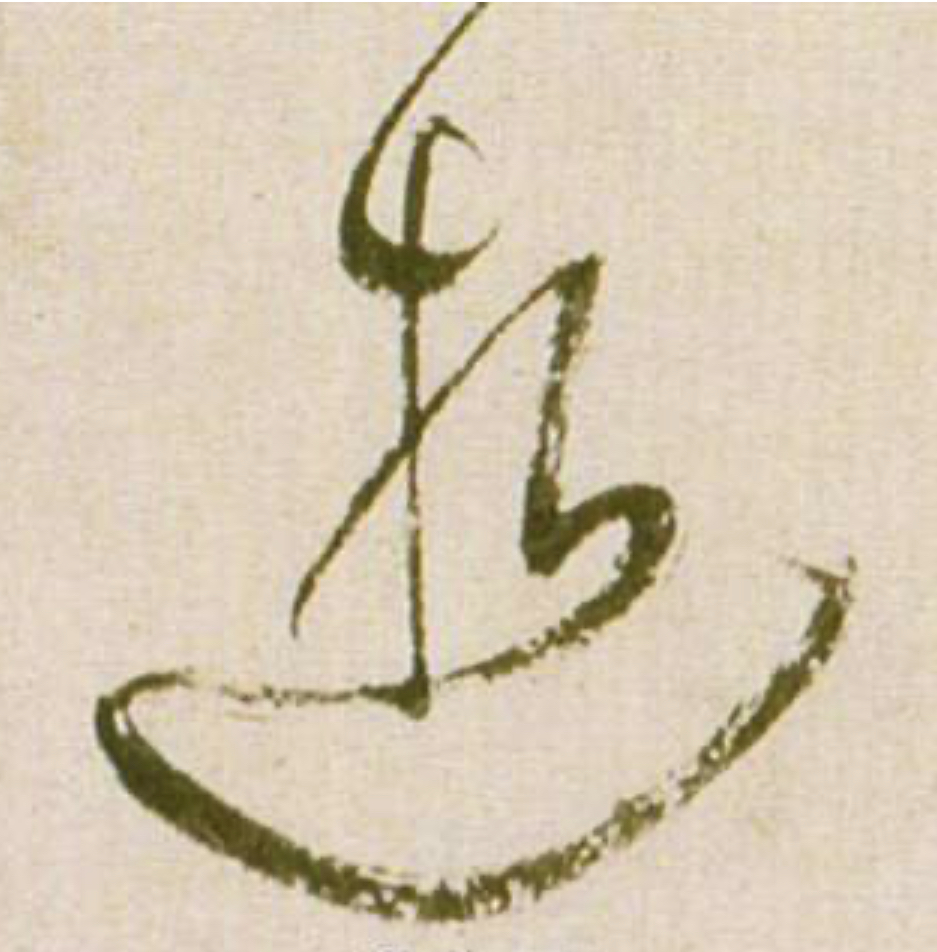The Tower of Reading
逝者如斯
This is the second chapter in Studying Short Classical Chinese Texts by Zhong Shuhe 鐘叔河,《念樓學短·論語十篇之二》。The title of Zhong’s selection of ten excerpts from the Analects of Confucius is ‘Everything Flows Like This’ 逝者如斯夫, a line from the Analects that is also the Chinese title of this chapter, sans the emphatic particle 夫 fū.
***
Contents
(click on a section title to scroll down)
***
Preface
The Tower of Reading is a series published by China Heritage focussed on the work of Zhong Shuhe (鐘叔河, 1931-), one of the most influential editors and publishers in post-Mao China and a writer celebrated in his own right both as a prose stylist and as an interpreter of classical Chinese texts.
The full title of the series — ‘Studying Short Classical Chinese Texts with The Master of The Tower of Reading’ — is our interpretive translation of 念樓學短 niàn lóu xué duǎn, the enticingly lapidary name under which Zhong Shuhe published over five hundred newspaper columns over three decades (see 念樓學短2002年 and 念樓學短2020年). The short title for the endeavour in China Heritage is simply The Tower of Reading.
Each chapter features a short text of under 100 characters which Zhong translates into modern Chinese. To these Zhong appends ‘A Comment from the Master of the Tower of Reading’ 念樓曰 niàn lóu yuē, ‘casual essays’ — 小品文 xiǎopǐnwén or 雜文 záwén, modern terms for such works, akin to the traditional terms 筆記 bǐ jì, ‘jottings’ or 劄記 zhá jì, ‘miscellaneous literary notes’ — that expanded on the theme of the chosen text, or a particular historical figure or a particular incident.
The Tower of Reading offers translations of the classical texts and of Zhong Shuhe’s interpretive essays along with the original Chinese versions of both.
For more on the background to this project, see Introducing The Tower of Reading.
***
The first section of Studying Short Classical Texts with The Master of the Tower of Reading consists of ten selections from the Analects of Confucius 論語. In Between Master & Student, the first chapter in Zhong Shuhe’s selections from the Analects, we introduced this material with a short essay by Simon Leys. We use Leys’s version of the Analects throughout.
Our thanks to Duncan Campbell for translating Zhong Shuhe’s commentaries on the Analects.
— Geremie R. Barmé
Editor, China Heritage
16 February 2024
The Festival of Humanity
甲辰龍年正月初七人日節
***
Other chapters in The Tower of Reading:
- Between Master & Student — Analects, The Tower of Reading, I.i
- Am I a Butterfly? — Zhuangzi, The Tower of Reading, VII.i
Further Reading:
- 鍾叔河著 《念樓學短》,長沙:岳麓書社,2020年
- The Analects of Confucius, Translation and Notes by Simon Leys, New York: W.W. Norton, 1997
- The Analects, A Norton Critical Edition, ed. Michael Nylan, trans. Simon Leys, W.W. Norton, 2014
- Lin Yutang, Confucius as I Know Him, The China Critic, IV:1 (1 January 1931): 5-9
- 李零,《喪家狗——我讀論語》自序,2006年10月15日
- The I Ching for Beginners, China Heritage, 9 January 2017
- 易: A Cable into the Abyss of a Darker Time, The China Story, 28 October 2015

***
‘Everything flows like this’
The Master stood by a river and said: “Everything flows like this, without ceasing, day and night.”
— Simon Leys, Analects, 9.17
子在川上曰。逝者如斯夫。不舍晝夜。
《論語·子罕·17》
***
A Comment from The Tower of Reading
In his book The Analects: A Modern Interpretation, Li Zehou (李澤厚, 1930-2021) tells us that: ‘In terms of philosophical discourse, this is arguably the most important sentence in the entire book.’
I’m rather ashamed to admit that I do not understand philosophy, although I do know that it is expected that one should treat ‘philosophical discourse’ with all due seriousness. Regardless, I choose to maintain a respectful distance since I always find all of that discourse to be far too ‘abstruse’. To my mind, things and life itself are, by and large, both fairly clear and pretty vivid, embodying meaning and variegated delight. For better or worse, one simply has to make some sense of it all. Once said things have been passed through philosophical analysis and have been duly elevated, a simple-minded person like me is usually left clueless about what is being claimed.
I think of Confucius as a humane man; he might also be called wise. But that doesn’t make him a philosopher, as he is labelled nowadays.
[Editor’s note: See also Lin Yutang, Confucius as I Know Him, The China Critic, IV:1 (1 January 1931): 5-9.]
The Confucius that we find in the Analects is not at all like the inviolable idol placed high up on a pedestal, and he is certainly not at all like the disciples (and disciples of disciples) of latter ages.
The line ‘Everything flows like this’ reflects Confucius’s sense of the mutability of life; it is something that we all sense when we truly take in our surroundings. This line inspires the thought that, after all, a stuffy old sage who lived 2500 years ago experienced the same feelings and thoughts as we do today. This realisation allows us then to better appreciate both the immutability and the grandeur of human nature. So succinct and fine is the way that this ancient worthy expresses this sentiment that it far outstrips anything I could come up with. Even famous lines in Chinese literature about change and impermanence such as ‘Night and day does the Great River flow’ (from a poem by Xie Tiao [謝脁, 464-499 CE]) of the Southern Qi, or (Du Fu’s [杜甫, 712-770] line from ‘Take the Heights’ 登高) ‘Ceaseless are the waves of the Yangtze River’s flow’ pale by comparison.
Thus, we might observe that such wisdom truly can transcend both time and space. ‘Everything flows like this’ — thought is the one thing that resonates down the ages.
[Editor’s note: Tradition holds that Confucius composed the Ten Wings 十翼, explications and commentaries, included in the I Ching 易經, a classical text on change.]
— Zhong Shuhe, translated by Duncan Campbell
***
Source:
- Chapter Two in Section One of Studying Short Classical Chinese Texts with The Master of The Tower of Reading 念樓學短, pp.4-5.
***
A Note by Simon Leys
Analects 9.17:
Everything flows like this: exact equivalent of panta rhei (πάντα ῥεῖ). Confucius and Heraclitus were contemporaries!
Traditional commentators usually read this passage as an ethical precept rather than as a cosmological statement. Flowing water is a fairly universal metaphor, used not only to suggest constant moral endeavor but also to provide psychological and emotional comfort see, for instance, Samuel Johnson (Rasselas, chap. 35): “Our minds, like our bodies, are in constant flux; something is hourly lost and something acquired … Do not suffer life to stagnate; it will grow muddy for want of motion: commit yourself again to the current of the world.”
Original Chinese Text
學其短:The selected Classical Chinese text, with a note on the source;
念樓讀:Zhong Shuhe’s translation into Modern Chinese; and,
念樓曰:Zhong Shuhe’s interpretive comment on the text.
子在川上《論語》
子在川上曰。逝者如斯夫。不舍晝夜。
【學其短】
- 本文錄自《論語·子罕》。
[念樓讀] 孔子站在河岸上,眼望著奔流不斷的河水,不禁感嘆道:
「要過去的,就這樣一去不回頭地過去了,沒日沒夜的啊!」
[念樓曰] 李澤厚著《論語今讀》,說「這大概是全中最重要的一句哲學話語」(原文如此)。我很慚愧,不懂哲學,對於「哲學話語」知道應該尊重,卻不大想去親近,因為它們總使我覺得太玄了。事物和生活本來是明白和生動的,自有其意思和趣味,多少總能理解一點;若是經過哲學家一分析一提高,頭腦簡單如我者,往往反而不知所云。
我以為孔子是一位仁人,也可以稱之為智者,卻不是今人所謂的哲學家,雖然二者都是 philosopher。
《論語》中的孔子不像他被供在聖堂上的樣子,更不像他後進的徒子徒孫。‘逝者如斯’這向話流露出 的無常之感,普通人觸景生情時總也有過,讀到它便會想到,原來二千五百年前的老夫子也有同我們一樣的感受和情思,從而覺悟到人性的永恆和偉大。而他老人家把話說得這麼精煉這麼好,不要說我自己說不出,就是「大江流日夜」 「不盡長江滾滾來」等名句比起來也不免遜色。於此又可見智慧的力量的確可以超越時空,逝者如斯,唯思想能長在耳。
***
Source:
- 鍾叔河著, 《念樓學短》,上冊,長沙:岳麓書社,2020年,第4-5頁。
***


